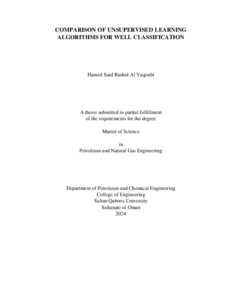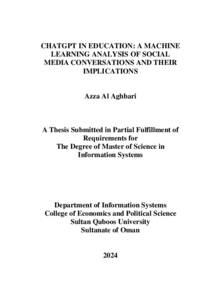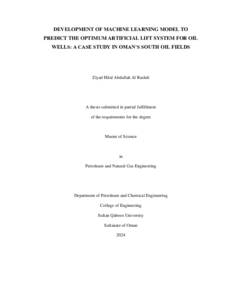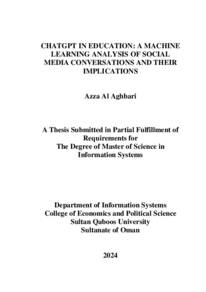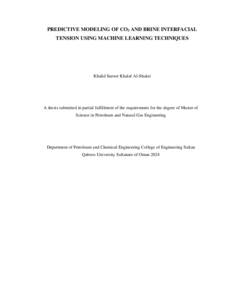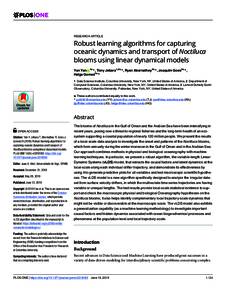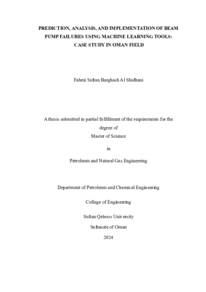Document
Comparison of unsupervised learning algorithms for well classification.
Source
Master's thesis
Other titles
مقارنة خوارزميات التعلم غير المشرف عليها لتصنيف الآبار
Country
Oman
City
Muscat
Publisher
Sultan Qaboos University
Gregorian
2024
Language
English
Thesis Type
Master's thesis
English abstract
The thesis covers the concept of unsupervised learning algorithms. These include different
clustering methods such as K-means, Fuzzy C-means, and Hierarchical clustering. The
models are utilized to classify wells in the oil and gas sector. Firstly, the study highlights
the essence of accurately classifying wells in the context of operational efficiency in
addition to the benefits of applying machine learning (ML) in well classification. It
assesses how unsupervised models can be used to transform operations in the energy
industry. The investigation aims to determine the comparative benefits of each clustering
algorithm in the energy sector. Some core constraints highlighted under each model
include reservoir characteristics, well settings, and operational variables. These attributes
determine the efficiency of each algorithm for well classification. The thesis also
highlights the significance of feature selection when undertaking unsupervised learning,
such as enhancing clustering precision and model efficacy.
The study methodology follows a concise process involving multiple steps starting from
data collection to model evaluation. Each algorithm is examined based on the performance
classification of the well data. The analysis focuses on validating clustering models
through various evaluation metrics, as well as the advantages and limitations of each
model. The investigation establishes that K-means is simple and effective, while
Hierarchical clustering allows one to extract nuanced insights into the structure of a
dataset. Fuzzy C-means enables soft-clustering yet struggles with defining separated
clusters.
The study establishes that all the models have a transformational potential for the industry.
As such, unsupervised learning effectively addresses the sector's classification needs.
Future investigations must delve deeper into algorithm enhancement, integration with
supervised learning, and alternative clustering models. The current findings can be
subjected to further validation studies and applied to real-world datasets. It will increase
operational efficiency and enhance decision-making in the oil and gas energy industry.
Arabic abstract
تتضمن الرسالة مراجعة مفهوم خوارزميات التعلم الغير مشرف عليها والمقارنة بينها، تشمل هذه الخوارزميات تجميع متوسط-كي، وتجميع متوسط-سي المبهم، والتجميع الهرمي. تهدف الدراسة إلى إستخدام هذه الخوارزميات لتصنيف آبار النفط والغاز لتسليط الذوء على أهمية هذا التصنيف عن طريق خوارزميات التعليم الآلي إلحذاث ثورة جديدة في قطاع الطاقة. تعمل الدراسة على تقييم أداء الخوارزميات بوجود قيود مختلفة مثل خصائص المكمن، وإعدادت تشغيل اآلبار، والخصائص الجغرافية، حيث تحدد هذه القيود أهمية إختيار الصفات األبرز قبل البدء بتطوير خوارزميات التجميع للتعزيز من كفاءة النموذج. تتبع منهجية الدراسة عملية موجزة تشمل خطوات متعددة تبدأ من جمع البيانات إلى تقييم النموذج. يتم فحص كل خوارزمية بنا ًء على تصنيف أداء بيانات البئر. تركز التحليالت على تقييم نماذج التجميع من خالل مختلف معايير التقييم، بالإضافة إلى المزايا والقيود لكل نموذج. تؤسس الدراسة أن كي-مينز بسيطة وفعالة، بينما يتيح التجميع الهرمي استخراج رؤى دقيقة حول بنية مجموعة البيانات. التجميع الضبابي يتيح التجميع الناعم ولكنه يواجه صعوبة في تحديد التجمعات المنفصلة. تؤسس الدراسة أن جميع النماذج لها إمكانية تحويلية للصناعة. وعليه، يعالج التعلم غير المشرف عليه احتياجات التصنيف في القطاع بفعالية. يجب أن تتعمق الدراسات المستقبلية في تحسين الخوارزمية والتكامل مع التعلم المشرف ونماذج التجميع البديلة. يمكن خضوع النتائج الحالية لمزيد من دراسات التحقق وتطبيقها على مجموعات بيانات واقعية. سيزيد ذلك من الكفاءة التشغيلية ويعزز اتخاذ القرارات في صناعة الطاقة بالنفط والغاز.
Category
Theses and Dissertations

